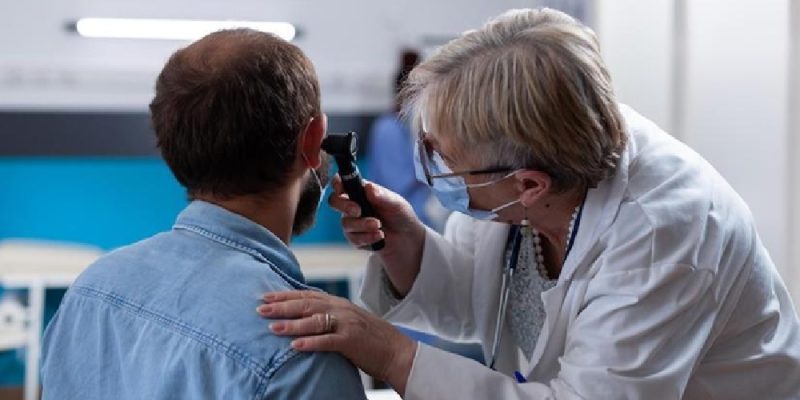Understanding The Causes Of Hearing Loss
Hearing loss is a common condition affecting individuals of all ages, caused by factors such as loud noise exposure and age-related degeneration. Loud noises in work or recreational settings can damage the inner ear, leading to gradual hearing decline. Age-related hearing loss, or presbycusis, often makes it hard to understand speech, especially in noisy environments. Other medical issues like infections and head injuries can also impair hearing.
Recognizing these causes is crucial for effective treatment. An ENT (Ear, Nose, and Throat) doctor can develop a tailored treatment plan to improve quality of life and restore confidence in daily activities.
The Importance Of Early Detection And Diagnosis
Early detection and diagnosis of hearing loss are vital for effective treatment. Untreated hearing impairment can lead to communication difficulties, social isolation, and cognitive decline.
Consulting an ENT Doctor provides a thorough evaluation using diagnostic tests like audiometry and tympanometry to identify underlying causes. Early detection enables prompt intervention, minimizing the impact on quality of life.
Timely diagnosis also allows for appropriate treatment recommendations, such as hearing aids. Addressing hearing loss early helps individuals engage socially and maintain well-being, preventing further complications.
The Role Of An ENT Doctor In Conducting Hearing Tests
The role of an ENT Doctor in diagnosing and managing hearing loss is vital. They conduct comprehensive evaluations to identify the causes of hearing impairment.
Essential diagnostic tools include audiometry, which measures hearing thresholds at various frequencies, and tympanometry, which assesses middle ear function. Imaging scans like CT or MRI may also detect structural abnormalities.
These tests help ENT Doctors understand a patient’s hearing status and develop tailored treatment plans, including hearing aids or other interventions based on individual needs.
Different Types Of Hearing Aids And Their Benefits
Hearing aids are vital for managing hearing loss, and ENT Doctors play a pivotal role in selecting and fitting them.
Common types include:
- Behind-the-ear (BTE): This device sits behind the ear, is versatile for various hearing loss levels, and is suitable for all ages.
- In-the-ear (ITE): This device is custom-made for the ear canal, is smaller, and is more discreet, which is ideal for mild to moderate hearing loss.
- In-the-canal (ITC) and completely in-the-canal (CIC): These are even more discreet, fitting entirely in the ear canal. Though they may offer less power, they are best for those wanting an inconspicuous option.
The ENT Doctor assesses individual hearing needs, lifestyles, and preferences to recommend the most suitable hearing aid, enhancing the patient’s quality of life.
How An ENT Doctor Determines The Right Hearing Aid For Each Patient
ENT doctor’s expertise matches hearing aids to each patient’s needs. They assess factors like hearing loss severity, lifestyle, communication needs, and preferences. For example, individuals with mild to moderate loss may prefer smaller in-the-canal (ITC) or completely-in-the-canal (CIC) models, while those with severe loss might require behind-the-ear (BTE) or in-the-ear (ITE) devices. BTE hearing aids have more power and durability, making them suitable for patients with more significant hearing impairments. The doctor also considers the patient’s environment. Those in noisy settings may benefit from noise-canceling features, while others might prioritize discreet designs. By focusing on comfort, ease of use, and aesthetics, the ENT doctor ensures the patient is satisfied with and comfortable using their device.
The Process Of Fitting And Adjusting Hearing Aids
Once the ENT Doctor selects the appropriate hearing aid, the fitting and adjustment process begins to ensure optimal comfort and performance.
This process starts with taking ear impressions to create a custom-fit earpiece or earmold, which minimizes feedback and enhances sound quality. The ENT Doctor then programs the hearing aid to match the patient’s hearing profile, adjusting volume and frequency response, and demonstrates how to use and maintain the device.
The ENT Doctor monitors patient feedback throughout the fitting, making adjustments to ensure satisfactory amplification and clarity. This collaboration is ongoing as the doctor modifies the hearing aid to adapt to changes in the patient’s hearing needs or preferences, ensuring the best possible experience.
Follow-Up Care And Maintenance Of Hearing Aids
Getting a hearing aid is the first step; ongoing care is essential for long-term success. The ENT Doctor assists with maintenance and follow-up support.
After fitting, regular appointments monitor progress and adjust the device. These visits assess improvement and address concerns.
The ENT Doctor teaches patients to care for their hearing aids, including cleaning and battery replacement, to extend their lifespan. Professional cleanings may also be recommended.
Ongoing support from the ENT Doctor is crucial for effective hearing aid use and enhancing the patient’s quality of life.
Other Services Provided By ENT Doctors For Hearing Loss Management
ENT Doctors not only diagnose and manage hearing loss and fit hearing aids but also offer additional services for comprehensive care.
They treat underlying medical issues, such as ear infections or structural abnormalities, which can help restore hearing. Additionally, they recommend therapies like speech therapy to improve communication skills and adapt to hearing aids.
ENT Doctors also focus on prevention by advising on hearing protection and may suggest earplugs for those exposed to loud noises. For severe cases, they may coordinate surgical options like cochlear implants.
Overall, ENT Doctors are committed to personalized care, ensuring tailored treatment that helps patients fully engage in their daily lives.
Conclusion: The Impact Of An ENT Doctor In Improving The Quality Of Life For Individuals With Hearing Loss
Hearing loss significantly affects communication and daily life, but ENT (Ear, Nose, and Throat) doctors are essential in helping individuals regain their independence.
ENT specialists diagnose and manage hearing loss through evaluations and testing, creating tailored treatment plans that often include fitting hearing aids to meet specific needs and lifestyles.
They also address underlying medical issues, coordinate speech therapy, and educate patients on preventing hearing loss. This comprehensive approach enhances patients’ quality of life.
Consulting an ENT Doctor can transform the experience of hearing loss, allowing individuals to reconnect with the world. If you or a loved one struggles with hearing loss, seek the expertise of an ENT Doctor to rediscover the joy of hearing.








Comments